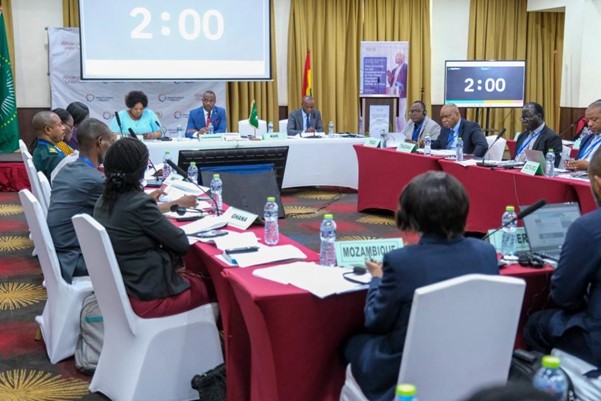…as senior officials of AU validate draft document
By Rashidatu IBRAHIM
Senior officials from the African Union (AU) and representatives of AU member-states have emphasised the need for effective migration policies across the continent.
This collective call was made during a two-day senior officers’ meeting in Accra, organised by the AU Commission’s Department of Health, Humanitarian Affairs and Social Development (HHS), in partnership with the International Organization for Migration (IOM) and German Development Cooperation.
The meeting aimed to validate the draft Plan of Action for implementing the Global Compact for Safe, Orderly and Regular Migration (GCM) in Africa. It was part of preparations for the Fourth Ordinary Session of the Specialised Technical Committee (STC) on Migration, Refugees and Internally Displaced Persons (IDPs), set to take place in Addis Ababa, Ethiopia, later this year.
Angela Martins, Acting Director of Social Development, Culture and Sports at the AU Commission, highlighted the importance of managing migration through sound policies, noting that both nations and migrants stand to benefit from well-regulated migration systems.
“We need to look at this document in a most practical and pragmatic way since once adopted, we shall be tasked in implementing it. In all these, we are guided by the Pan-African ideology that this process is an AU member-state driven process for African migrants by Africans.
“We are also guided by the understanding that migration is key to social and economic development, benefitting migrants, countries of origin, transit and destination. Realisation of these developmental benefits requires that migration must be managed in ways that promote sound migration policies and practices at a national, regional and continental level,” she intimated.
She further commended Ghana in the implementation of the Global Compact on Migration (GCM). This move, she noted, is evident in the recent development and consideration of the country’s National Action Plan on the implementation of the GCM.
“Such a good and exemplary efforts need to emulated by all other AU member-states and Regional Economic Communities (RECs) as well. We hope this Draft Plan of Action will provide the necessary guidance of how National Action Plans should be developed.”
Acting Chief Director of Ghana’s Ministry of Interior, Doreen P. Annan, in her opening remarks, acknowledged the progress made in the implementation process but stated that much more remains to be done.
She urged participants to consider the multi-dimensional nature of migration challenges, which are exacerbated by violent extremism, growing food insecurity and the impacts of climate change globally.
“Migration has been integrated into our national development policy framework. Further broader consultation with stakeholders have been held to formalise the national implementation plan for the Global Compact on Migration (GCM) in Ghana. Despite the modest gains, a lot remain undone in terms of implementation.
“Globally, while millions of migrants and displaced persons have been factored in national development planning, far too many of them have been left behind in the planning process,” she said.
Mrs. Annan further reiterated Ghana’s commitment to working with the African Union to ensure meaningful implementation of the GCM, adding: “Ghana is committed to the GCM clauses through the implementation of its National Migration Policy, the National Labour Migration, and the recently adopted Diaspora Engagement Policy”.
The Plan of Action is expected to provide guidance for the development of National Action Plans across AU member-states, affording a harmonised approach in the reporting and reviewing mechanism – which is very vital for the continent.
Other key speakers at the meeting included the Acting Director for Social Development, Culture and Sports of the HHS Department, Angela Martins; Fatou Diallo Ndiaye, Chief of Mission of IOM Ghana (resident), Benin and Togo; and Dr. Japhet Lishomwa, Director-General, Department of Immigration, Zambia, who doubles as the Chair of Specialised Technical Ccommittee on Migration, Refugees and Internally Displaced Persons (IDPs).










